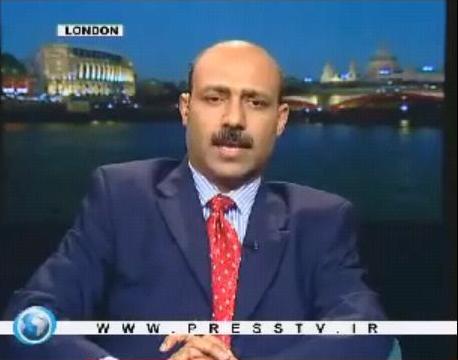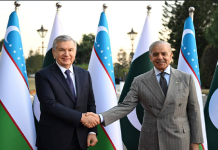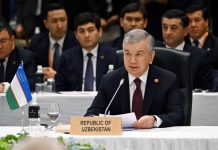Press TV has conducted an interview with Dr. Shahid Qureshi, editor of The London Post, about newly-elected prime minister of India and what his election could mean for India and its neighbors.
The following is an approximate transcript of the interview.
Press TV: Modi’s campaign was centered around a pledge to revive an ailing economy. Our other guest (Uday Bhaskar) talked about Gujarat. Can his moderate success in that state be reproduced nationally do you think?
Qureshi: First of all I think it is a very sad day for the minorities in India and its neighbors who is seeing this man who has been banned to enter the United States of America. I don’t know how he is going to enter the US in the next few years as the prime minister and what the United States is going to do to lift the sanctions on this man.
This man is following the ideology of a person who was impressed by Hitler i.e. the head of the RSS. And the RSS has close links with Israel and their involvement in the train bombing and other bombings – and my colleague will agree that these are results of the investigations done by the Indian security forces and police where they found these RSS and fundamentalists involved in terrorist activities and they were blaming Muslims for all these terrorist acts.
SO NOW IT SOUNDS LIKE THIS HAS BECOME A VIRTUAL HINDU STATE. FROM A SECULAR STATE IT IS NOW A VIRTUAL HINDU STATE, WHICH MR. MODI’S ACTIONS ABOUT ABOLISHING MUSLIM PERSONAL LAW AND FINISHING THE AUTONOMOUS STATE OF KASHMIR WILL BRING HIM ONE STEP CLOSER TO A NUCLEAR STAND-OFF WITH PAKISTAN.
Any adventurism at this stage with Pakistan will be – no matter who is sitting in Islamabad – will be irrelevant. Any kind of adventurism by the BJP (Bharatiya Janata Party) following their track record will be catastrophic for the whole region.
I’m saying with full authority this is a time when both countries Pakistan and India have fresh elections and Mr. Sharif has been in power for about a year; he has lost trust in the Indian peace partnership because he has tried for over a year, the status he wanted to give, but he did not get anything in return from India.
And that is the fundamental problem that since 1947 the leadership in India has divided India into a sub-continent twice: once in 1947; second time in 1971 by creating Bangladesh and conspiring against Pakistan over the division. And this is something that they could have worked on very closely.
One of my colleagues said yesterday to me – an expert in LSC (Legal Services Corporation Act) – that this is a fight between the siblings, So if it a fight between the siblings within India and Pakistan then the older sibling should comfort and damage control and build bridges between India and Pakistan, it should have been the policy; but that has not been the case.
WE HAVE BEEN FACING A HOSTILE NEIGHBOR. AND IT’S NOT ONLY WITH PAKISTAN, IT’S WITH CHINA WITH BANGLADESH – ALL ITS NEIGHBORS ARE SUFFERING FROM THE INDIAN FOREIGN POLICY.
This is a fundamental change, which needs to happen no matter who does it, but if India needs a role in the world stage, these are the problems, which Indian needs to solve. And as soon as they solve these problems, the rest of the problems will go away automatically.
I am hoping the Indian establishment will be very careful by any design or any orders coming from this man who is a criminal, who is involved in killings of innocent Muslims – no matter if the Indian judiciary has exonerated him – internationally he is a criminal and he is a killer.
Press TV: I have a hard time understanding how he is going to carry out these promised business reforms perhaps and how he is going to improve the economy. His campaign was centered around a pledge to revive the ailing economy, when we talk about how he is going to do that in manufacturing, foreign investments or overhauling different types of infrastructures that obviously are dilapidated in India.
He hasn’t given clear cut strategies behind that. How do you think he’s going to do that – do you foresee him being able to do that?
Qureshi: I will just respond to my colleague in Delhi that Mr. Modi was the chief minister and the killing was going on… So he was the chief minister and he was directly responsible for allowing those killings, even if he says he was not directly involved he was the chief minister, he is responsible for every person that died as a result of those riots.
Coming back to the economy part of it… India as in Pakistan, the number one problem is corruption. The Indians have the largest number of Swiss bank accounts in Switzerland and I think this is what Mr. Modi is also addressing.
Referring to his victory speech today what Mr. Modi has said in his victory speech is entirely different to what the members of the RSS and the BJP have in their manifesto and how they’re going to treat more than 350,000 Dalits and the Sikhs and the other Christian minorities apart from Muslims.
I’m keeping in view the history – the Golden Temple was demolished, almost attacked, militarized; the Barbary mosque incident; and the burning of the Christian churches is not a very healthy sign for a county to progress, to move forward.
The caste system – I’m not criticizing I’m just stating a fact – that if you’re sitting next to a person whom you think is lower than you… so what democracy or the exercise of putting a ballot paper in a box is going to make in the mentality of a person who is sitting on the top and thinking because I am a Brahmin also therefore I am a high caste and therefore somebody who has also gotten similar votes coming to national assembly or the parliament is lower than me.
I don’t know how and I’d love to understand from my colleague how it is going to work in a democratic system and in a moral system where we exercise this democratically and realistically; and especially in the Indian army – how is it going to work out with the low caste and the higher caste…how these people are treated? The minorities will be marginalized.
Press TV: I want to talk about China. There was an incursion or a 21 day stand-off back in last May, which involved China with India. How is Modi going to establish a positive relationship with China?
He on one hand has warned China of expansionist mindset, but at the same time he has visited China and touted their economic achievements. So it is kind of confusing the message that he is sending when it comes to China.
Qureshi: The Chinese entered the Kashmir area for about 19 kilometers – that is what The Times of India reported and there was no reaction from the central government regarding this Chinese advancement and the Indian defense minister was also visiting Beijing at the time.
I think it sounds like Mr. Modi’s policy towards Pakistan might be a little bit hostile, but towards China it will be very positive. He is an economic man so he would want his economy to progress, but with regards to Pakistan he might have to look to his home audience or his BJP membership to keep them quiet.
And one point I would like to mention that the people who killed Mr. Gandhi were the people who Mr. Modi belonged to. They were historically members of the RSS who were responsible for the assassination of Mr. Gandhi, maybe due to his views. My colleague will agree with that.
So what we are saying is we wish all the best to India, but having said that the problem with neighbors needs to be resolved including the longstanding issue of Kashmir.
The human rights violations, the 700,000 Indian army forces stationed there, if you de-militarize that area – and in Pakistan as well on equal footings – you will see these people will have no more issue with Pakistan; there will be a closer relationship.
What has happened in the past 65 years can be damage controlled by any new generation coming in.
(Dr Shahid Qureshi is senior analyst with BBC and editor of The London Post. He writes on security, terrorism and foreign policy. He also appears as analyst on Al-Jazeera, Press TV, MBC, Kazak TV (Kazakhstan), LBC Radio London. He was also international election observer for Kazakhstan and Pakistan. He has written a famous book “War on Terror and Siege of Pakistan” published in 2009. He is PhD in ‘Political Psychology’ and also studied Law at a British University)






